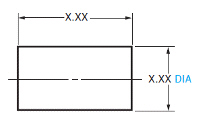Deck 18: Interchangeable Parts, Allowances, and Classes of Fit
Question
Question
Question
Question
Question
Question
Question
Question
Question
Question
Question

Unlock Deck
Sign up to unlock the cards in this deck!
Unlock Deck
Unlock Deck
1/11
Play
Full screen (f)
Deck 18: Interchangeable Parts, Allowances, and Classes of Fit
1
Define the term clearance maximum.
Clearance maximum is the loosest fit between two mating parts.
2
Define the term limits.
Limits are dimensions related to the largest (UL) and smallest (LL) boundary or location acceptable size of a feature.
3
 The accompanying figure is an example of a(n) ____ fit.
The accompanying figure is an example of a(n) ____ fit.A) nominal
B) transition
C) interference
D) nominal
B
4
Discuss the concept of basic size.

Unlock Deck
Unlock for access to all 11 flashcards in this deck.
Unlock Deck
k this deck
5
The general dimension used to identify a commercial product is known as ____.
A) nominal size
B) actual size
C) clearance size
D) designed size
A) nominal size
B) actual size
C) clearance size
D) designed size

Unlock Deck
Unlock for access to all 11 flashcards in this deck.
Unlock Deck
k this deck
6
A(n) ____ is required with parts that are to be forced together as a single unit.
A) negative clearance
B) positive clearance
C) negative fit
D) positive fit
A) negative clearance
B) positive clearance
C) negative fit
D) positive fit

Unlock Deck
Unlock for access to all 11 flashcards in this deck.
Unlock Deck
k this deck
7
____ contain a significant number of views, dimensions, notes, and other information to produce a single part.
A) Overview drawings
B) Reference drawings
C) Detail drawings
D) Clearance drawings
A) Overview drawings
B) Reference drawings
C) Detail drawings
D) Clearance drawings

Unlock Deck
Unlock for access to all 11 flashcards in this deck.
Unlock Deck
k this deck
8
Discuss design specifications and classes of fits including transition, clearance and interference fit.

Unlock Deck
Unlock for access to all 11 flashcards in this deck.
Unlock Deck
k this deck
9
The prescribed, intentional difference in the dimensions of mating parts is known as the ____.
A) tolerance
B) clearance
C) allowance
D) interference
A) tolerance
B) clearance
C) allowance
D) interference

Unlock Deck
Unlock for access to all 11 flashcards in this deck.
Unlock Deck
k this deck
10
____ is the true measurement of a part after it had been produced.
A) Nominal Size
B) Designed Size
C) Clearance Size
D) Actual Size
A) Nominal Size
B) Designed Size
C) Clearance Size
D) Actual Size

Unlock Deck
Unlock for access to all 11 flashcards in this deck.
Unlock Deck
k this deck
11
Discuss interchangeable manufacturing.

Unlock Deck
Unlock for access to all 11 flashcards in this deck.
Unlock Deck
k this deck



